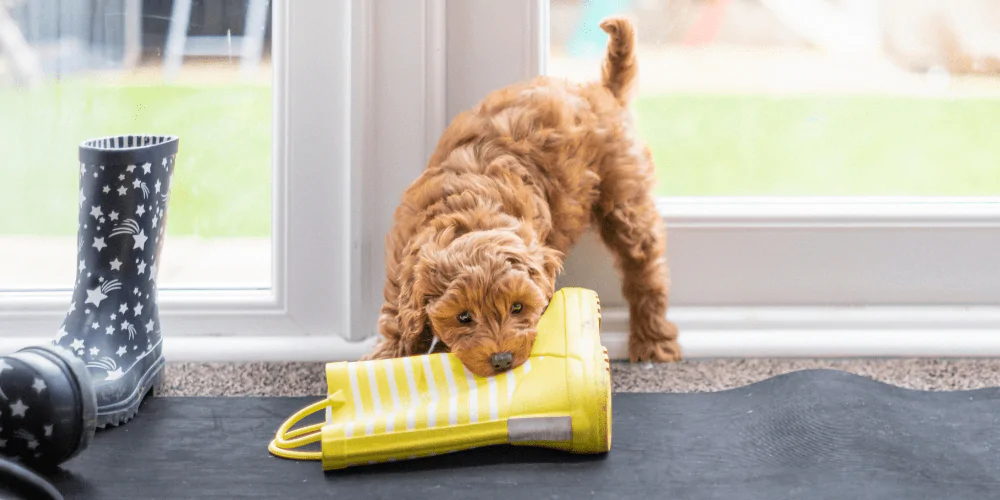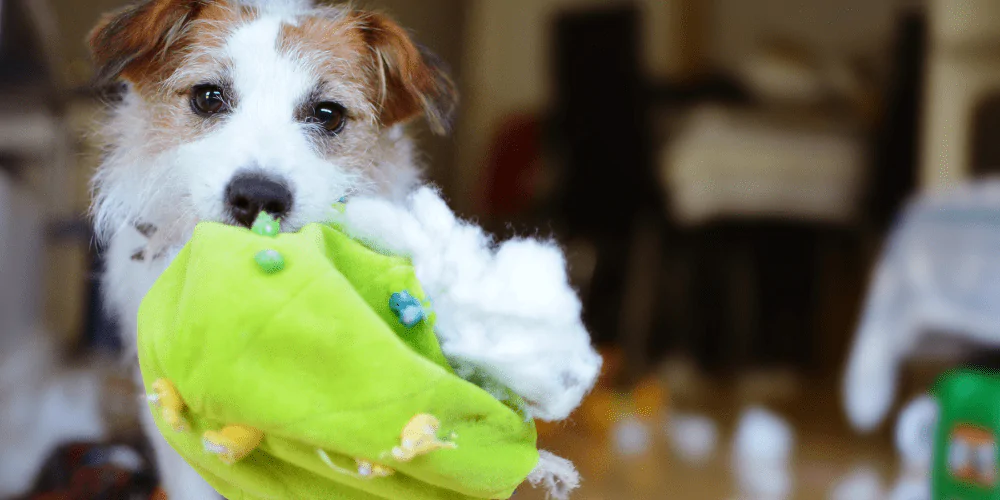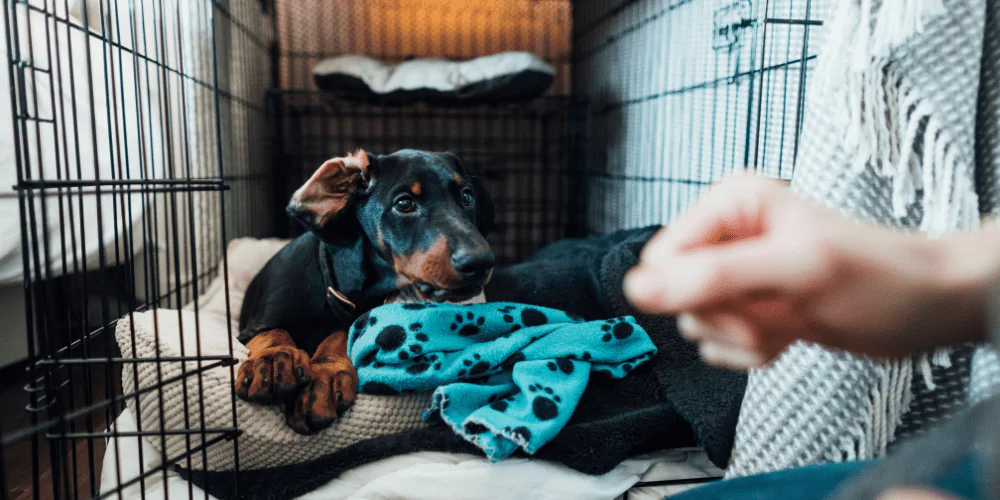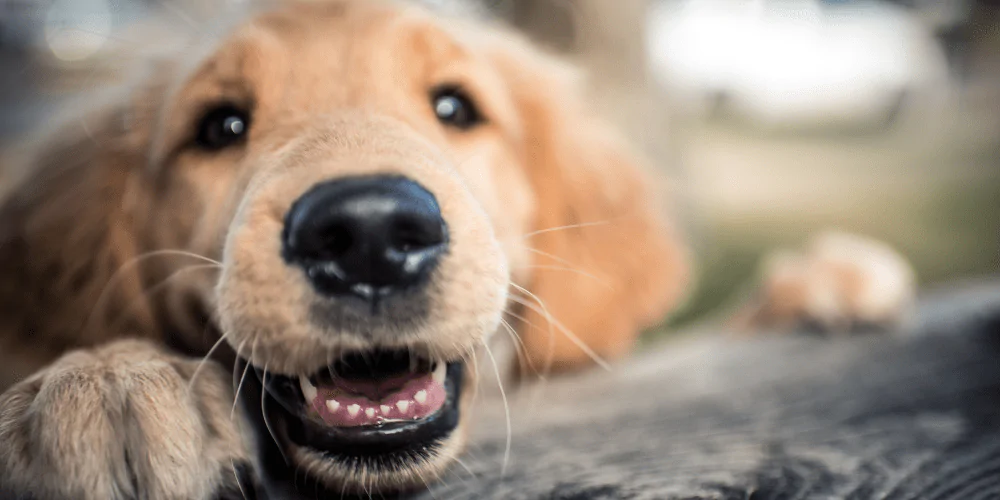
Coping with the puppy blues: Vet tips for new puppy parents

Dr Scott Miller
25 January 2024 | 7 minutes read
Getting a puppy is a whirlwind of excitement, happiness, and… unexpected emotional turmoil? As wonderful as it is to have that new little four-legged family member, being a puppy parent is toughgoing.
Dr Scott Miller is here to teach you what you need to know about the puppy blues. Read on to get expert tips on how to feel more confident in your new caregiving role.
- Is it normal to feel regret after getting a puppy?
- Why is my puppy making me feel depressed?
- How to cope with the puppy blues
- When do I get my life back after getting a puppy?

Is it normal to feel regret after getting a puppy?
If you’ve ever felt regret about getting your puppy, you’re not alone. Many pet parents – both new and experienced – question whether they made the right decision in bringing home a dog.
These feelings are so common that there’s even a collective name for them – the ‘puppy blues’. Pet parents going through the puppy blues can feel:
- Sad
- Anxious
- Stressed
- Overwhelmed
- Nostalgic for their pre-puppy life
So don’t feel guilty about those pangs of regret, because it’s a natural part of your new role.

Why is my puppy making me feel depressed?
Similar to babies, puppies demand a lot of your time and attention. They have a whole new world to explore, learn about, and discover, which can lead to challenging behaviour.
This combination of responsibility and behavioural problems can affect the mental health of many puppy parents and other family members. Let’s take a look at some of the most common worries and stresses of raising a puppy.
> Changes to your routine
What may have once been a semi-structured day completely turns upside down to fit your puppy’s needs.
Suddenly you’re:
- Waking up several times in the middle of the night to let your pup out for a wee.
- Spending most of your day with them and trying to slowly increase the time they’re left alone.
- Planning your activities around puppy training, feeding, and playtime.
It can be hard to adjust to these unpredictable, early months of your puppy’s life, especially when you’re also losing sleep.
> Adjusting to your new lifestyle
- Being there for your puppy means giving up your old lifestyle for a completely new one. You now have to:
- Create a new schedule that fits in activities like walking and feeding your puppy.
- Remember to not be away from your pup for more than four hours at a time. Otherwise, you’ll need to arrange doggy daycare.
- Budget for all the costs that come with a dog, from puppy insurance to food and regular health checks and vaccinations.
- Turn down friends and family on some of the social activities you could once do. And it can be tough if some people aren’t understanding of your new availability.
> Damage to the house
You might feel like you’ve bitten off more than you can chew being a dog owner. Although your puppy apparently doesn’t share the same sentiment!
Is that your favourite pair of slippers chewed up in the corner? A chunk slowly going missing from a wooden table leg? Sometimes it feels like your baby shark is chomping everything they see.
> Challenging puppy behaviour
As part of that growing and learning phase, there’s usually something that your puppy is doing to test your resolve:
- Barking at night
- Accidents in the house
- Pulling on the lead
- Chewing things they shouldn’t
- Ignoring you, whether on recall or when being asked to do something
> Self-doubt about your parenting skills
You always want to do your best for your new four-legged family member. But how do you know if you’re taking care of them properly?
Talking to other pet parents about how they’re raising their puppy can make you question what and how you’re doing things.

How to cope with the puppy blues
First things first – be kind to yourself. Remember that you’re not the only one struggling with the puppy blues and there’s no shame in admitting you’re finding it tough.
The good news is you have lots of help out there to support you through this new adventure. Here are a few ideas to make managing puppyhood a little easier.
> Create a puppy-proof home
Making their home environment as safe as possible is one way to ease your anxiety about your puppy’s wellbeing.
Ways to do this include:
- Using safety gates to keep your puppy within sight in one room at a time
- Locking away toxic food in high-up cupboards where they can’t be reached
- Change any toxic plants for pet-friendly alternatives
- Invest in stimulating toys like Kongs to keep your puppy distracted from chewing things they shouldn’t
- Make use of a crate when you and your puppy need some quiet, wind-down time – this is also great for a safe time out when family, friends, and other pets are there
Find out more about puppy-proofing your home with this handy puppy checklist.
> Give yourself flexibility in your puppy’s routine
Setting up a routine is a good way to give structure and stability to your puppy – but try not to be too strict in your timings.
Your puppy can get anxious if they’re used to a chronic routine and you have to break from this in any way.
Instead, dog behaviourists suggest ‘windows’ of time for your puppy’s regular activities. That way they know that something will happen around that window but won’t hyperfixate on an exact time.
For example:
- Instead of giving them their breakfast at exactly 7am – change up breakfast time each day to feed your pup between 7am and 8am.
- Rather than taking them out for a walk at 5pm on the dot – mix up when you head out so it falls between 5pm and 6pm.
> Sign up for puppy training classes
Introducing positive reinforcement training early on helps to teach your puppy essential skills.
You can either join a structured puppy training class or use online resources to teach cues at home. Remember:
- Some good basics to start with include teaching your puppy handling, recall, and to ‘leave it’
- Be patient and consistent
- Make sessions short and fun to keep your puppy’s focus
Training and playing enrichment games can also help to keep their curious minds entertained. After all, a bored puppy is a destructive puppy.
> Get professional behavioural support
Don’t struggle alone if your puppy’s behaviour is especially challenging. There are lots of qualified dog trainers and behaviourists who can help.
The experts can support with things like:
- Getting your puppy through toilet training
- Managing your pup’s unwanted biting behaviour
- Teaching your puppy to be comfortable with different people and animals
- Helping your puppy to feel safe in different environments
> Connect with other pet parents
Sometimes you just need to get things off your chest with someone who ‘gets it’. So think about joining up with local dog groups and online pet parent forums.
These communities are full of friendly puppy parents going through similar struggles and are happy to swap stories and advice.

When do I get my life back after getting a puppy?
You may feel like there’s no end in sight but puppy parenting does get easier with time. A big part of this is getting over those early hurdles of settling in your puppy and getting a routine in place.
Remember:
- All dogs are individuals and develop at their own pace, even within the same breed. So try not to focus too much on what other puppies are doing.
- Continue to be calm and patient with your four-legged family member as they learn and grow. In time, things will calm down into a new normal.
- Be prepared for the inevitable teenage dog phase when they seem to forget everything they’ve been taught and challenge you all over again. Remind yourself that it’s just that – a phase that they will grow out of. Your job is to be understanding about the many hormonal changes they’re going through. And hopefully, you’ll soon have a happy adult dog on the other side.
- Turn to others for support when you need it, whether that’s a vet, behaviourist, or fellow puppy parent.


